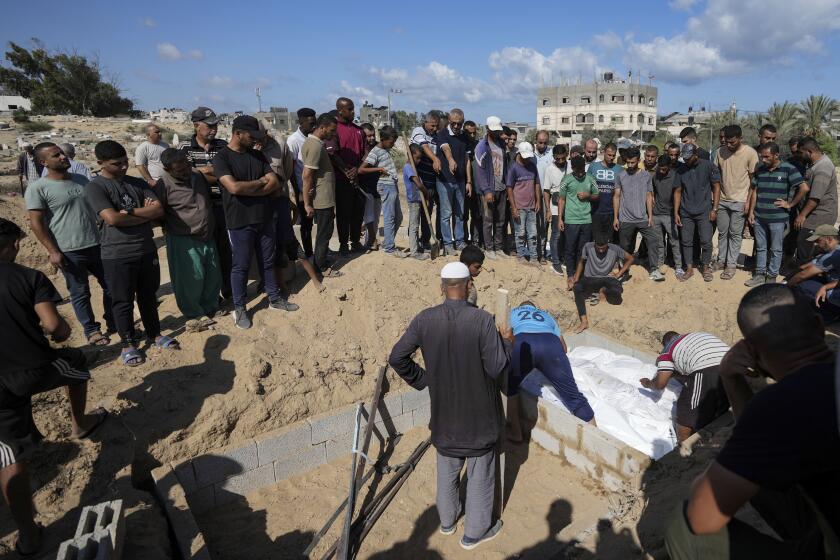After hostage killings, can the Israel-Hamas cease-fire talks be revived?

- Share via
TEL AVIV — In the wake of the deaths of six Israeli hostages, including a California-born U.S. citizen, both the Israeli government and the Palestinian militant group Hamas are signaling hardened postures that pose a wrenching new challenge for the Biden administration.
For weeks, U.S. officials have said they were near a final agreement between Israel and Hamas that would halt fighting in the Gaza Strip, temporarily at least, and allow for the release of hostages from Hamas captivity. At the same time, it would bring freedom for some Palestinians held prisoner by Israel, and allow more aid, desperately needed, to reach Gazans.
But intractable holdups, over who and how many people should be released from each side and over a full withdrawal of Israeli troops from Gaza, prevented a deal — and that was before the latest hostage killings.
Now the U.S. is continuing work on negotiations — but not involving Israeli Prime Minister Benjamin Netanyahu, who President Biden said Monday was not doing enough to secure the hostages’ freedom.
Instead, the president said then, U.S. contacts are with “colleagues from Egypt and Qatar” — the two nations with direct contact with Hamas officials.
Grief and anger in Israel as authorities say Hersh Goldberg-Polin, a native of Berkeley, and five other hostages were killed in Gaza. Many direct fury at Israeli Prime Minister Benjamin Netanyahu.
“We are working day and night to try to get an agreement over the line,” State Department spokesman Matthew Miller said Tuesday. He would not comment on Netanyahu’s apparent rejection of elements of the deal. “We obviously believe this is an urgent matter.”
The news Tuesday evening that the Justice Department had announced terrorism charges against the leaders of Hamas will probably bring even more uncertainty in talks. The leaders are facing charges, including conspiracy to murder U.S. nationals, in connection with the militant group’s cross-border incursion into Israel Oct. 7 that killed about 1,200 people.
With the war entering its 12th month, Gaza is in the grip of a full-blown humanitarian disaster. At least 41,000 Palestinians have been killed, according to the territory’s health officials, who do not differentiate between civilians and militants. Nearly all of the seaside enclave’s 2.3 million people are displaced, with entire cities bombed into mountains of rubble.
Mohammad Abu Al-Qumsan lost his children, wife, and mother-in-law in an Israeli strike that hit a Gaza Strip apartment building while he was away.
Early negotiating success — a U.S.-brokered accord last November that temporarily halted the fighting in Gaza and freed more than 100 hostages — is now a distant memory. Of the approximately 250 captives taken Oct. 7, Israel believes about 100 hostages remain in Gaza and at least a third are already dead.
The grieving families of the six slain hostages — who Israel says were shot in the head by their captors last week as troops operated nearby — voiced hopes that the violent deaths might prove the impetus for an accord that would free the remaining captives.
Jon Polin, father of Berkeley-born Hersh Goldberg-Polin, said Monday in a eulogy addressed to his 23-year-old son that over the months, the family had “sought the proverbial stone that we could turn over to save you.”
“Maybe, just maybe, your death is the stone” that could help bring the rest of the hostages home, he told the thousands of assembled mourners.
In Israel, thousands honored Hersh Goldberg-Polin, a California native and the only U.S. citizen among six hostages found killed in Gaza.
“I really hope that this is a turning point,” said Gil Dickmann, a cousin of Carmel Gat, another of the dead hostages, expressing similar hopes as he spoke to reporters hours before her funeral, also on Monday.
But amid a national spasm of grief, neither Netanyahu nor Hamas gave the slightest public hint that any movement was in the offing.
A big part of the problem, said Mara Rudman, a former special Middle East envoy for the State Department, is that neither Netanyahu nor Hamas chief Yahya Sinwar is motivated to halt the fighting.
“From the get-go, Netanyahu and Sinwar are the two in this equation whose interests do not align with getting to a cease-fire agreement,” she said in an interview.
Her analysis is chilling: Sinwar does not care about Palestinian deaths, since his goal is to stir international opprobrium against Israel and domestic turmoil within, and Netanyahu cares foremost about his political survival and avoiding prison, given criminal cases pending against him, which would be jeopardized if he agreed to a cease-fire deal that his far-right coalition partners object to.
With the death toll in Gaza over 40,000 after 10 months of the Israel-Hamas war, the small, densely packed Palestinian territory is crammed with bodies.
At a Monday evening televised news conference, the Israeli leader signaled intransigence, declaring that Israel’s military control over a narrow strip of territory on the Gaza-Egypt border, known as the Philadelphi Corridor, was non-negotiable.
The nine-mile ribbon of land that Israel took control of in May, Netanyahu said, was “Hamas’ pipeline for oxygen and rearmament.”
“The axis of evil needs the Philadelphi Corridor,” he said. “We need to have it under our control.”
Palestinian TikTok star Medo Halimy shared his ‘tent life’ posts after his family took refuge in southern Gaza. He was killed by an Israeli airstrike in a designated safe zone.
Hamas, for its part, sought to harshly dissuade Israel from any notion that hostages could be freed by military force, such as the Israeli raid that plucked four captives to safety in June from the crowded Nuseirat refugee camp. Palestinian officials said the Israeli raid killed scores of civilians, many of them women and children.
In a posting on the Telegram messaging app on Monday, the head of Hamas’ armed brigades appeared to suggest that an execution protocol had been put in place if Israeli troops were thought to be closing in.
“After the Nuseirat incident, new instructions were issued” to those guarding the captives, said the statement issued in the name of Abu Obeida, a nom de guerre.
Israeli officials interpreted the statement as a threat to kill hostages if Israeli troops were nearby, with the killings of the six as a gruesome illustration of that intent.
Netanyahu is under some of the strongest public pressure in months to strike a deal. Hundreds of thousands of Israelis flooded the streets of communities across Israel on Sunday, after the killings of the six were disclosed, and organizers have called for large demonstrations to continue nightly.
Protesting crowds chant slogans denouncing the prime minister as morally responsible for the hostage killings, and some wave signs depicting him with blood on his hands. But many among Netanyahu’s loyal base of supporters believe his commitment to an unrelenting military campaign is the best way to confront Hamas, ensure Israel’s safety and perhaps ultimately to free the hostages.
Illustrating the split over how to move forward, areas of the country where Netanyahu’s support is high largely declined to take part in a general strike called Monday by the country’s biggest labor federation.
While Netanyahu still has the fealty of most of his Cabinet, including the far-right figures who insist on continuing an all-out war, the country’s security establishment — notably his defense minister, Yoav Gallant — has publicly questioned his negotiating stance, accusing him in essence of searching for excuses to spurn a deal.
The prime minister’s latest show of defiance over the border strip also drew scorching editorial commentary.
“The Philadelphi route will wind up a highway paved with the hostages’ bodies,” analyst Zvi Bar’el wrote in the left-leaning Haaretz daily.
Netanyahu is well aware, though, that many Israelis derive a visceral satisfaction from the military hunting down the perpetrators of heinous acts in southern Israel on Oct. 7.
Almost everyone here remembers the militants’ killing of a father of two named Gil Taasa, in the community of Netiv Haasara, one of many Israeli villages attacked that day. An assailant tossed a grenade into a shelter, killing him as he tried to shield his two young sons.
Widely viewed video showed the aftermath: the two bloodied boys cowering in shock in their living room as the attacker casually took a bottle of cola from the family’s refrigerator.
On Tuesday, the army said the man in the video, identified as Ahmed Fozi Wadia, a Hamas commander, had been killed in an airstrike in Gaza City along with seven other militants.
A military decision on when to carry out such strikes commonly comes only at the last moment even when they are planned well in advance, and normally depends on many factors. But however coincidental, the reported timing struck some as symbolic: Saturday, the day the hostages’ bodies were discovered.
Times staff writers King and Wilkinson reported from Tel Aviv and Washington, respectively.
More to Read
Sign up for Essential California
The most important California stories and recommendations in your inbox every morning.
You may occasionally receive promotional content from the Los Angeles Times.
















